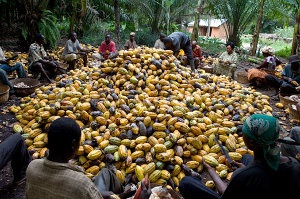Cocoa farmers have urged Ghana Cocoa Board (Cocobod) to urgently work out specific programme to help eradicate the cocoa swollen-shoot viral disease to help improve crop yields.
Between 2006 and 2010, over 28 million trees were removed for being infected or for being in contact with infected trees by the disease.
Currently, the disease is responsible for 15% of total cocoa crop loss in the world. It was first discovered in Ghana in 1936, and is currently endemic in Togo, Ghana and Nigeria. Over 200 million trees have already been claimed by this disease.
In an interaction with some farmers in the Atwima-Mponua District of the Ashanti region, the farmers appealed to the Cocoa Swollen Shoot and Viral Disease (CSSVD) Unit of the Cocobod to come to their aid in fighting the disease to prevent a decline of crop yield.
They complained that black pod and capsid diseases had become widespread in the area, and that there is an urgent need for the right chemicals to help salvage the situation.
They said the present arrangement where they had to travel long distances to buy chemicals and other inputs to maintain their farms, was not helpful.
“Middlemen were taking advantage of the situation to cheat farmers by selling pesticides, insecticides and cocoa fertilisers to farmers at exorbitant prices,” Nana Yaw Bronya, District Chief Farmer said.
Nana Bronya bemoaned the inadequate cocoa extension officers posted to the area, adding “is simply impossible for the single officer to cover all the communities.”
Mr. Kingsley Owusu-Appiah, Nkawie District Cocoa Officer, assured the farmers of the increased the number of extension officers to help the farmers to adopt best farming practices.
“Cocobod is determined to see a significant rise in cocoa production levels, and that is why it has introduced a special project under which fertilisers are being distributed free of charge to selected farmers,” he said.
He said more than 800 cocoa farmers in Atwima-Mponua, Nwabiagya, Atwima-Kwanwoma and parts of Ahafo-Ano North and South districts, have been supplied with a total of 3,400 bags of fertilisers.
Business News of Monday, 28 July 2014
Source: B&FT

















